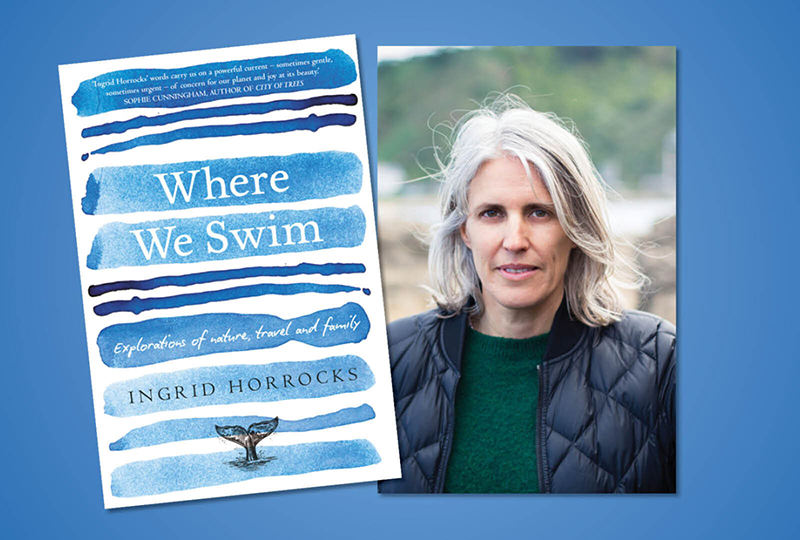Review: Where We Swim by Ingrid Horrocks
Water is associated with washing and renewal. This is, of course, part of the ritual of baptism, which has at times, in the history of the Church, involved full immersion. Swimming adds another element – prolonged immersion in an element that is foreign, in the sense of bodies of water, especially rivers and oceans, that are not our natural environment. In writers so inclined, this can lend itself to meditations on the body and our place in the world.
Ingrid Horrocks, inspired in part by Roger Deakin’s classic book Waterlog, writes about swimming in the waters of New Zealand, where she lives, and in other spots such as Arizona. Not all chapters are centred on swimming, but she usually mentions swimming somewhere. She writes about the way the body responds to water, the way swimming in the ocean orients us in the immensity of time and space, and, as does Rebecca Giggs in her recent book Fathoms, the difficulty of imagining how whales see the world. For whales, water is their atmosphere, their land; our world, their outer space.
Otherwise, her book is about family connections, which she likens to a Venn diagram. The lives of family members converge and diverge, expand with children, shift with ageing. If water is a fundamental element, so is family, and Horrocks’ book is about the currents of family we swim in.
The book is also about the roles of women, and about women writers. Returning to her watery theme, she writes on women and the nineteenth-century practice of ocean bathing in Britain, and how this bathing, rather then being freeing, reflected the age by being controlling and restricting, with the excuse of protecting women’s modesty. Horrocks wonders how these women felt – did they, despite the restrictions, get a taste for the simple physicality of swimming and the other-worldly nature of the ocean?
Her writing about swimming in the ocean perhaps inevitably turns to environmental themes, and how looming crises have a socio-economic element. Swimming pools in South American apartment complexes can symbolize how money brings access to water. She writes about the pollution in waterways, even in supposedly pristine New Zealand where, she notes, green themes are prominent, but the percentage of four-wheel drive car ownership is one of the highest in the world. Travelling to Phoenix, Arizona, she notes the irony – perhaps even the stupidity – of a city of year-round sunshine being so poorly tuned to solar power, and she thinks about the strangeness of swimming pools in such a dry environment, perhaps reflective of a more general hubristic tendency to think we can bend the natural world to our collective will, with a blindness to the long-term consequences of such bending.
Writing about nineteenth-century bathers, Horrocks notes how this kind of activity was touted as a ‘nature cure’, as if the point of nature is how it can benefit our renewal. She notes the irony of turning to nature for healing when nature needs us to heal it. Of course, more focus on the natural world is good for our health, but she warns against human-centred utilitarian views of nature. In the Book of Genesis, God points out the benefits of the world for humans, but he also delegates a duty of care.
Nick Mattiske blogs on books at coburgreviewofbooks.wordpress.com and is the illustrator of Thoughts That Feel So Big.












